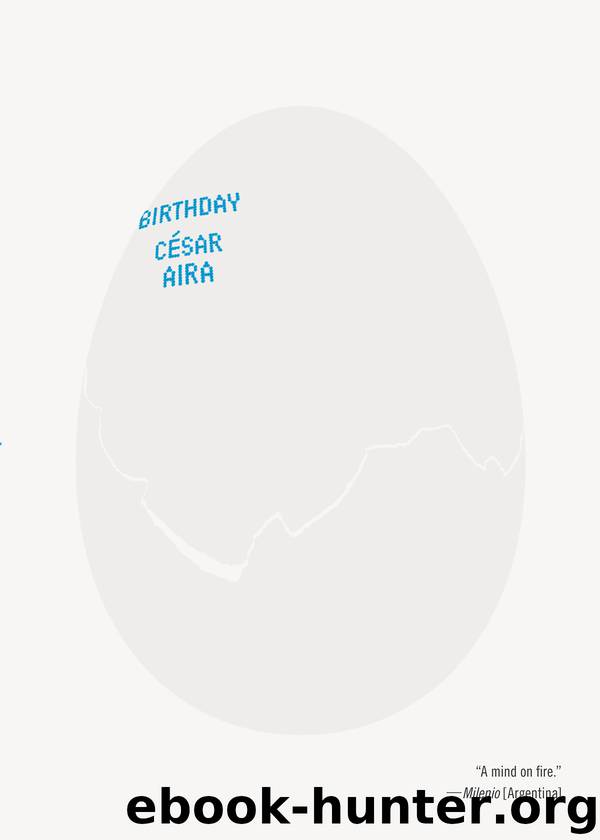Birthday by César Aira

Author:César Aira
Language: eng
Format: epub
ISBN: 9780811229067
Publisher: New Directions
Published: 2019-02-26T00:00:00+00:00
VI
Like all of my contemporaries, I could die at any moment. Today, tomorrow, yesterday. An accident, or a fatal illness (it wouldn’t be all that unusual, at my age) . . . It’s a lottery, but luckily it seems to be as difficult to win (or to lose, in this case) as a real lottery with tickets. What I would feel, if it happened to me, was that an injustice had been done, or even that some mistake had been made. How can I die if I haven’t even lived yet? Believers console themselves with the idea of “the life to come,” the happy life of the blessed, especially in cases of premature death. Naturally, that was how the girl at the Avenida thought about her brother. I would find it much harder to apply that idea to myself, because the very concept of a life “to come” presupposes a life “here and now.” If you haven’t lived even one life, what’s the point of starting over? You might say that everyone has a life, no matter how brief. But that kind of simplification implies that there is equal cause to lament the death of a five-year-old child and that of a man of ninety. It’s conventional sentimentalism. The lamenting is always done by other people, who don’t really care at all, at least compared to the way they would care about their own deaths. To lament, you have to be alive, which almost always means you’re waiting for life to begin.
In a way, you don’t have to be a believer to believe in the life to come, because the two lives are superimposed and blended in the present. “He who waits despairs,” as the proverb says. I would say: “He who waits deludes himself” because what you’re waiting for has already begun and sometimes it’s already over. That’s the nature of the present.
Last night before falling asleep, I was trying to clarify the question of the Last Judgment. According to my simplified version of Christian eschatology, the dead have to wait for the Last Judgment to be judged and assigned a definitive destiny in the life to come. You die, and then there’s a blank space, a nothing, until you wake up on Judgment Day. The living, that is, the survivors, might imagine that the dead go directly to Heaven or Hell, but it can’t be like that for the dead themselves, because there would have to be two times running simultaneously — Eternity and time in the world — and that is impossible. So we have to wait until the end of time, till Judgment; all the rest (simultaneity, Dante, the return of the living dead, spiritualism, and so on) falls into the category of fiction. There’s another reason too: people can’t be definitively judged at the moment of their death, because they go on affecting the present via the continuing reverberation of their deeds and works, or simply because of the weight they had in the system of the world, be it great or small, which means that they go on accumulating merits and demerits.
Download
This site does not store any files on its server. We only index and link to content provided by other sites. Please contact the content providers to delete copyright contents if any and email us, we'll remove relevant links or contents immediately.
The Hating Game by Sally Thorne(19219)
The Universe of Us by Lang Leav(15063)
Sad Girls by Lang Leav(14399)
The Lover by Duras Marguerite(7888)
The Rosie Project by Graeme Simsion(6371)
Smoke & Mirrors by Michael Faudet(6180)
Big Little Lies by Liane Moriarty(5782)
The Shadow Of The Wind by Carlos Ruiz Zafón(5680)
The Poppy War by R. F. Kuang(5677)
An Echo of Things to Come by James Islington(4844)
Memories by Lang Leav(4794)
What Alice Forgot by Liane Moriarty(4623)
From Sand and Ash by Amy Harmon(4496)
The Poetry of Pablo Neruda by Pablo Neruda(4089)
The Tattooist of Auschwitz by Heather Morris(3836)
Ficciones by Jorge Luis Borges(3623)
Guild Hunters Novels 1-4 by Nalini Singh(3460)
The Rosie Effect by Graeme Simsion(3457)
THE ONE YOU CANNOT HAVE by Shenoy Preeti(3365)
